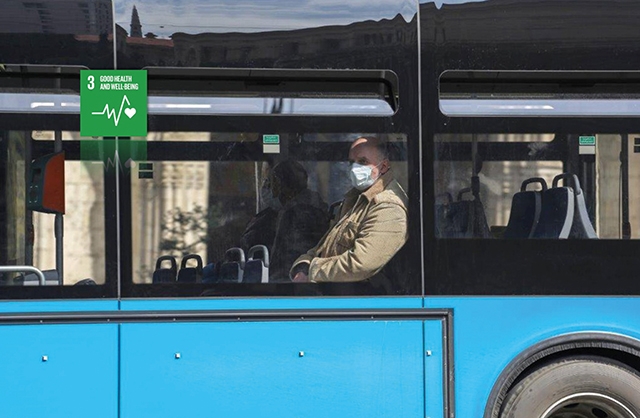Stepping Up COVID-19 Awareness in Georgia’s Municipalities
As the coronavirus pandemic reaches Georgia’s regions, the United Nations Development Program (UNDP) is assisting municipalities across the country to prepare for the threat and keep citizens informed.
Over 30,000 leaflets and posters on COVID-19 prevention, as well as outdoor stickers for marking social distancing, were delivered to the seven municipalities: Mtskheta, Zugdidi, Tetritskaro and high-mountainous Ambrolauri, Oni, Lentekhi and Tsageri, that were put under strict quarantine on 10 April after multiple cases of infection were discovered. The materials were distributed by local public servants working with activists’ groups to avert a wider outbreak.
“The pandemic is an unprecedented threat that is testing our resilience as a society and our ability to stand together in the face of a common challenge,” said UNDP Head Louisa Vinton. “Cooperation between citizens, civil society and local governments is key to limiting the spread of the virus in rural areas, and ensuring that all citizens, including vulnerable and marginalized groups, receive timely and accurate information.”
Supported by Switzerland, Austria and Denmark, in coordination with the Government Administration and the Ministry of Regional Development and Infrastructure, this information campaign is part of UNDP’s broader COVID-19 response.
The same partners also came together to organize the printing and distribution of 35,000 leaflets on COVID-19 in Armenian and Azerbaijani languages to ensure that the citizens of municipalities with large concentrations of ethnic minorities received adequate information. The southern municipalities of Marneuli and Bolnisi have been in lockdown since the first cases were detected there on 23 March. UNDP also supported the creation of the Armenian-language version of the government’s much-praised official website on the coronavirus pandemic, StopCoV.ge.
In addition, UNDP is providing the United Water Supply Company, a crucial water utility, with $18,000 worth of protective gear, including facemasks, coveralls, gloves, hand sanitizer and disinfectant, to ensure that front-line staff, responsible for maintaining water supplies in many of the country’s urban municipalities, can do their jobs safely.
In the first days of the COVID-19 outbreak in Georgia, UNDP set in motion a rapid response mechanism to help identify and address pandemic-driven needs at central and local levels. Working closely with the government, donors and partners, UNDP is helping to spread the message about the pandemic and reaching out to the vulnerable and marginalized groups, communities in remote mountainous regions, persons with disabilities and national and ethnic minorities.
This assistance to municipalities is made possible through rapidly designed and agreed adaptations to programs to support regional and local development, good governance and decentralization reform that UNDP has been implementing in Georgia since 2012 in partnership with the Swiss Agency for Development and Cooperation (SDC), the Austrian Development Cooperation (ADC), the Danish Government and the Ministry of Regional Development and Infrastructure.
Income losses are expected to exceed $220 billion in developing countries, impacting education, human rights and, basic food security and nutrition. Photo by Nino Zedginidze/UNDP












